Economics may seem like a daunting and complex subject, but understanding the basics of how the economy works is essential for anyone looking to make informed financial decisions. In this crash course on Economics 101, we will break down key concepts and principles that shape the economy and impact our daily lives.
What is Economics?
Economics is the study of how scarce resources are allocated to meet unlimited wants and needs. It examines how individuals, businesses, and governments make decisions about how to use resources such as labor, capital, and natural resources to produce goods and services. Economics also explores how these decisions affect production, consumption, and distribution of wealth in society.
Key Concepts in Economics
Supply and Demand: The relationship between supply and demand is a fundamental concept in economics. Supply refers to the quantity of goods and services that producers are willing and able to offer at a given price, while demand refers to the quantity of goods and services that consumers are willing and able to purchase at a given price. The interaction of supply and demand determines the price and quantity of goods and services in the market.
Gross Domestic Product (GDP): GDP is the total value of all goods and services produced within a country's borders in a given period. It is used as a measure of a country's economic performance and is a key indicator of economic growth.
Inflation: Inflation refers to the increase in the general price level of goods and services over time. It erodes the purchasing power of money and can have significant impacts on consumers, businesses, and the overall economy.
Unemployment: Unemployment is the number of people who are willing and able to work but cannot find employment. It is an important indicator of the health of the labor market and the overall economy.
Fiscal Policy: Fiscal policy refers to the use of government spending and taxation to influence the economy. Governments use fiscal policy to promote economic growth, control inflation, and address other macroeconomic challenges.
Monetary Policy: Monetary policy refers to the actions taken by a central bank to control the money supply and interest rates. Central banks use monetary policy to achieve economic objectives such as price stability, full employment, and sustainable economic growth.
International Trade: International trade refers to the exchange of goods and services between countries. It allows countries to specialize in the production of goods and services in which they have a comparative advantage and can lead to increased efficiency and economic growth.
FAQs
Q: What is the difference between microeconomics and macroeconomics?
A: Microeconomics focuses on individual or small-scale economic decisions, such as the behavior of firms and consumers in the market. Macroeconomics, on the other hand, examines the economy as a whole, including factors such as inflation, unemployment, and economic growth.
Q: How does the stock market impact the economy?
A: The stock market is a key indicator of the health of the economy and can impact consumer confidence, investment decisions, and overall economic performance. Changes in stock market prices can also affect wealth distribution and consumption patterns.
Q: What role does government play in the economy?
A: Governments play a critical role in the economy through their fiscal and monetary policies, regulation of industries, and provision of public goods and services. Governments also seek to address market failures and promote economic stability and growth.
Q: How does international trade impact the economy?
A: International trade allows countries to benefit from specialization and comparative advantage, leading to increased efficiency and economic growth. However, international trade can also lead to job displacement, income inequality, and other social and economic challenges.
In conclusion, understanding the basics of economics is essential for anyone looking to navigate the complexities of the modern economy. By familiarizing yourself with key concepts such as supply and demand, GDP, inflation, and fiscal policy, you can make more informed decisions about your personal finances and better understand the broader economic forces at play. With this crash course in Economics 101, you are now equipped to tackle the challenges and opportunities of the dynamic world of economics.











